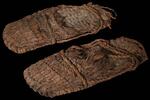Oregon’s Great Basin holds some of the oldest archeological finds in North America, including the world’s oldest known footwear. In 1938, Oregon archeologist Luther Cressman recovered fiber sandals at Fort Rock Cave that date back nearly 10,000 years.

Roughly 10,000-year-old sagebrush sandals found at Fort Rock Cave.
University of Oregon, Museum of Cultural and Natural History
More recent discoveries date back even earlier, making the region home to some of North America’s oldest known human occupation sites.
This weekend, tribal knowledge-holders, anthropologists, and archeologists will share these finds and others at the “Human Experience in the Oregon Great Basin Symposium.”
The two-day event begins Saturday at the Oregon State University-Cascades campus in Bend.
Related: Watch: "Oregon Experience: Coprolites"
The free symposium offers the general public a chance to learn about recent archeological research, partnerships, and online resources dedicated to the earliest known history of humans in the Great Basin.
Topics will include ongoing work at Lake County’s Paisley Caves, where archeologists from the University of Oregon made one of the most remarkable discoveries to date. Beginning in 2002, they unearthed 14,000-year-old fossilized feces – or coprolites.

Coprolite recovered from Paisley Caves.
Brian Lane
DNA testing in 2020 proved the coprolites were human, challenging prevailing theories of when the first people arrived in North America.
The symposium is presented by the Confederated Tribes of Warm Springs, the Burns Paiute Tribe, the Oregon Historical Quarterly, the Deschutes Historical Museum, and the University of Nevada, Reno.
The symposium is filled to capacity and no longer taking registrations. If you miss it, the Oregon Historical Quarterly editor, Eliza Canty-Jones, says the journal plans an upcoming issue featuring the topics covered at the event.
